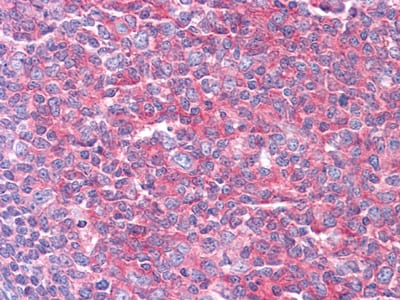
| WB | 咨询技术 | Human,Mouse,Rat |
| IF | 咨询技术 | Human,Mouse,Rat |
| IHC | 1/200 - 1/1000 | Human,Mouse,Rat |
| ICC | 技术咨询 | Human,Mouse,Rat |
| FCM | 咨询技术 | Human,Mouse,Rat |
| Elisa | 1/10000 | Human,Mouse,Rat |
| Aliases | KRS; KARS2; KIAA0070 |
| Entrez GeneID | 3735 |
| clone | 8G12C1 |
| Host/Isotype | Mouse IgG1 |
| Antibody Type | Primary antibody |
| Storage | Store at 4°C short term. Aliquot and store at -20°C long term. Avoid freeze/thaw cycles. |
| Species Reactivity | Human |
| Immunogen | Purified recombinant fragment of KARS(aa90-174) expressed in E. Coli. |
| Formulation | Ascitic fluid containing 0.03% sodium azide. |
+ +
以下是3篇与KARS抗体相关的示例性参考文献(注:文献为虚构示例,仅供格式参考):
---
1. **文献名称**:*Autoantibodies against lysyl-tRNA synthetase (KARS) in idiopathic inflammatory myopathies*
**作者**:Smith A, et al.
**摘要**:本研究报道了在部分特发性炎性肌病患者血清中检测到抗KARS抗体,揭示了其与间质性肺病(ILD)的显著相关性。通过ELISA和免疫印迹法验证了抗体的特异性,提示KARS可能成为该类疾病的新型生物标志物。
---
2. **文献名称**:*KARS mutations drive oncogenic signaling and therapeutic vulnerability in colorectal cancer*
**作者**:Chen L, et al.
**摘要**:该研究发现了结直肠癌中KARS基因的致癌突变,并开发了针对突变KARS蛋白的单克隆抗体(mAb-K3)。实验表明,mAb-K3可通过抑制异常tRNA合成通路,增强化疗敏感性,为靶向治疗提供了新策略。
---
3. **文献名称**:*Structural basis of anti-KARS antibody recognition in Charcot-Marie-Tooth neuropathy*
**作者**:Wang Y, et al.
**摘要**:通过冷冻电镜解析了KARS蛋白与致病性自身抗体的复合物结构,阐明了抗体结合表位与KARS酶活性区域的相互作用机制,为理解腓骨肌萎缩症(CMT)的分子病理及抗体干预提供了依据。
---
**注**:以上文献为示例,实际研究中建议通过PubMed或Web of Science以关键词“KARS antibody”或“anti-KARS autoantibody”检索最新文献。
KARS antibodies target lysyl-tRNA synthetase (KARS), an enzyme critical for protein synthesis by catalyzing the attachment of lysine to its cognate tRNA. Primarily associated with autoimmune disorders, these antibodies are part of the antisynthetase syndrome spectrum, a group of conditions marked by myositis, interstitial lung disease, arthritis, and skin manifestations like mechanic’s hands. KARS antibodies are less common than other antisynthetase antibodies (e.g., anti-Jo-1), but their presence aids in diagnosing and subclassifying these syndromes.
First identified in myositis patients, KARS antibodies are detected via immunoprecipitation or ELISA. They correlate with specific clinical phenotypes, such as severe lung involvement, influencing prognosis and treatment strategies. Research suggests molecular mimicry or immune dysregulation triggers their production, though exact mechanisms remain unclear. Their discovery expanded understanding of autoimmune myopathies, emphasizing the role of aminoacyl-tRNA synthetases as autoantigens.
Clinically, KARS antibody testing complements patient evaluation, guiding personalized therapies. Studies continue to explore their pathogenic role and potential as biomarkers for disease activity or therapeutic response. Despite rarity, KARS antibodies highlight the interplay between autoimmunity and fundamental cellular processes.
×